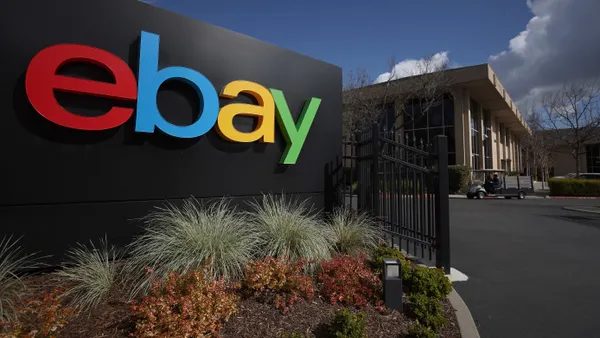The retail landscape has changed dramatically over the last year, with themes such as the decline of mall-based retail and the rise of e-commerce darlings dominating headlines. For some retailers, 2016 spelled the end, but for others, it fueled record sales and futuristic ideas to revolutionize in-store shopping.
Before retailers look forward to the trends and technologies the new year will bring, it's important to reflect on some of the most impactful events of 2016. Retail Dive put together a calendar of our picks for the most important news stories from each month this year.
-
January: The first appliances in Amazon's Dash Replenishment program go live
Amazon Dash Buttons — a range of lozenge-shaped, WiFi-enabled devices allowing the e-commerce giant’s Prime subscribers to replenish everyday household goods with a single push of a button — is the Trojan horse delivering automated commerce technologies into the consumer mainstream. Amazon kicked off 2016 by announcing the first Amazon Dash Replenishment Service consumer hardware devices, partnering with manufacturers like GE, Samsung, Brita and Brother to offer home appliances, office equipment and even healthcare monitoring tools that automatically replenish supplies like detergent and printer ink.
There are now more than 200 different Dash Buttons encompassing everything from Airheads candy to ZonePerfect nutrition bars, and Amazon claims sales have increased by 5x over the last year. Amazon also continues building out its Dash Replenishment Service program, in November adding device manufacturers GeniCan, Honeywell, Nestle and WePlenish and unveiling new Dash-enabled products from Whirlpool and PUR.
-
February: American Apparel emerges from Chapter 11 as a private company
American Apparel — once a favored destination for urban basics as well as a champion of progressive labor practices and paragon of provocative, racy advertising — has more recently fallen on hard times. Hobbled by millions of dollars of debt, sluggish sales, mounting competition from fast-fashion outlets and costly litigation against controversial founder Dov Charney, American Apparel finally filed for Chapter 11 bankruptcy protection in October 2015, emerging in February as a private company.
But it was too late to stop the bleeding. American Apparel failed to regain its footing under CEO Paula Schneider, who stepped down in September, and a month later, the company filed for Chapter 11 again. This time, there will be no turnaround bid: Canadian T-shirt manufacturer Gildan has submitted a stalking horse bid of $66 million for American Apparel’s brand and may also acquire some of its inventory and manufacturing operations, but none of its stores.
-
March: Judge takes major issue with FTC in Staples/Office Depot proceedings
The proposed $6.3 billion merger of Staples and Office Depot dominated headlines throughout the first half of 2016. While the office supply rivals argued their combined business would still be challenged by upstarts in the space, in particular e-commerce threats like Amazon, the Federal Trade Commission vehemently disagreed and requested an injunction. With March drawing to a close, U.S. District Judge Emmet Sullivan threw a wrench into the proceedings when he unsealed documents showing the FTC pressured Amazon to lie and say its business supplies efforts would not be ready to compete until 2017, when in fact the online retail giant had already expanded into the segment; the revelation seemed to herald a major turning point in the matter, which increasingly seemed to favor the FTC’s argument that the merger would stifle competition in business contracts.
Several additional twists and turns later, the FTC prevailed: In May, Sullivan granted the FTC’s request, and Staples terminated the merger. Instead of forging an international office supply juggernaut with the kind of brick-and-mortar presence to neutralize the e-commerce threat, Staples and Office Depot are once again rivals, and each spent the remainder of the year scrambling to identify a path forward. Staples installed a new CEO and unloaded its U.K. business, while Office Depot is still searching for a new CEO, closing stores and selling off its European operations.
-
April: Sports Authority throws in the towel, opts for liquidation
Once the largest sporting goods chain in the U.S., Sports Authority fell from grace during the first half of the decade, hamstrung by hundreds of millions of dollars in debt incurred via heavy investments in e-commerce and store remodels, mounting competition from longtime nemesis Dick’s Sporting Goods as well as emerging rival Amazon, and profound struggles to differentiate its brand. Following weeks of reports indicating Sports Authority had missed payments to suppliers, failed to make a $20 million interest payment and started shedding employees and stores, the retailer finally filed for Chapter 11 bankruptcy protection in early March.
Although Sports Authority went into its bankruptcy process expecting to reorganize, battles with suppliers undermined those plans, and at the close of April, the company officially threw in the towel, opting for liquidation. Dick's Sporting Goods ultimately won the auction for Sports Authority’s intellectual property rights, also taking on leases for 31 Sports Authority stores. Dick’s said in November it would retain 22 of those leases for conversion to Dick’s Sporting Goods stores and leverage the customer information it purchased to improve its marketing efforts during the holiday season — its first without Sports Authority as a rival.
-
May: Aeropostale files for bankruptcy, closing 154 stores
When Aeropostale filed for Chapter 11 bankruptcy protection in early May, it looked like just another casualty of a fast-evolving retail environment it had no idea how to navigate. Like American Eagle Outfitters and Abercrombie & Fitch, its chief rivals in the teen apparel space, Aeropostale watched helplessly as its logo-centric clothing fell out of favor. Increased competition from fast fashion brands and declining mall traffic also took their toll, and heading into the spring of 2016, the company had suffered 13 consecutive quarters of losses.
Seemingly against all odds, Aeropostale survives. After a Hail Mary joint offer of $243.3 million from a consortium including landlords Simon Property Group and General Growth Properties along with licensing firm Authentic Brands Group eclipsed a rival auction bid from private equity firm Sycamore Partners at a September auction, Aeropostale was able to negotiate new rent-reduction deals with mall landlords, keeping 400 of its North American stores open — about 75% more than previously estimated. David Simon, chairman and CEO of Simon Property Group, said last month Aeropostale could even grow back to 500 profitable stores, the kind of scale the retailer hasn't seen since its pre-bankruptcy days.
-
June: Macy's CEO to resign; successor named
The Terry Lundgren era is coming to a close. The longtime Macy’s CEO, who transformed the company into America’s largest department store chain during his 13 years at the helm, announced in June he will resign his post at the end of March 2017, passing the reins to handpicked successor Jeff Gennette as part of a transition plan that included Gennette’s election as Macy’s president in 2014.
The challenges facing Gennette are immense. Under Lundgren, Macy’s has struggled to keep pace with changing consumer tastes and shopping behaviors, losing significant ground to fast-fashion upstarts as well as online merchants like Amazon, which is projected to surpass Macy’s as the nation’s largest apparel retailer next year. Despite closing stores for years, with yet 100 additional locations slated to shutter by early 2017, experts suggest Macy’s current closure plans may very well turn out to be just the tip of the iceberg. With millennials favoring online shopping over brick-and-mortar experiences, Macy’s also is investing heavily in its e-commerce sales and omnichannel efforts, also inking partnerships with Apple and gadget specialty retailer Brookstone. You don’t need a crystal ball to know that Genette’s official coronation next spring looms among the biggest retail stories of 2017.
-
July: Amazon calls Prime Day 'biggest day ever,' orders up 60% worldwide
Prime Day, an Amazon-invented holiday started only a year ago, was the single biggest day in company history, and that didn’t change even after Black Friday and Cyber Monday delivered record-shattering e-commerce sales four months later. While Amazon accounted for 30.9% of total revenue generated from Black Friday to Cyber Monday, Amazon shoppers spent 7% more on Prime Day, a testament to the success of the self-made shopping holiday.
Despite a few technical hiccups, which prompted a Twitterstorm accompanied by the hashtag “#PrimeDayFail,” the summertime shopping bonanza also boosted visibility of Amazon services such as Prime Now, as well as branded devices like the Echo and Echo Dot voice-activated speakers. With just two Prime Day events under its belt, Amazon proved that with the right creative juices and digital means, retailers can invent shopping holidays to outshine and redefine even the biggest shopping days of the year.
-
August: Wal-Mart buys Jet for record-breaking $3b
Wal-Mart made one thing very clear this year: E-commerce is critical to a profitable future. The retail giant, known for its enormous brick-and-mortar footprint, shocked many analysts when it boldly completed the biggest deal in U.S. e-commerce startup history.
Year-old startup Jet, which has been disrupting e-commerce delivery with its innovative pricing algorithms, gave Wal-Mart a hip digital edge just as it committed to slowing supercenter store openings and focusing on e-commerce. Wal-Mart has struggled to compete online, with growth stagnating at around 7% and online sales of $14 billion in 2015, paling in comparison to Amazon's $99 billion retail business. Co-opting Jet gives Wal-Mart an opening with younger, deeper-pocketed and more urban shoppers, and will likely bolster its competitive edge against Amazon, although many analysts say Amazon shouldn't lose sleep over the deal.
-
September: Report: Sears to shut more Kmart stores in 13 states
Sears, a once-revolutionary company in the retail sector, this year lost whatever luster it had left. Parent company Sears Holdings announced a wave of Kmart and Sears store closures this summer, and in September reported additional closures scheduled for this month.
Despite Sears Holdings CEO Edward Lampert’s adamant defense of the company, and the millions of dollars his hedge fund has poured into it, Sears reported its 20th straight quarterly sales and revenue miss in early December. In a somber earnings call, the retailer announced accelerated closures of unprofitable stores to combat declines and plans to sell off its Kenmore, Craftsman and DieHard brands and Home Services business. The recent exit of several executives from Sears has caused some to speculate that bankruptcy is increasingly imminent, and although the timing is hard to anticipate, for many analysts, one thing is clear: Sears is a sinking ship.
-
October: Bass Pro Shops acquires Cabela's for $5.5B
The proposed merger of Bass Pro Shops and Cabela's brings together the preeminent brands in U.S. outdoor sports retail. Long before the deal, the two companies shared much in common, including established catalog businesses and many of the same customers. But the proposed merger certainly didn’t escape the scrutiny of the Federal Trade Commission: The deal was delayed by the FTC in early December after the agency asked the companies for more information. The FTC has until Dec. 29 to either complete its review or compel the need for a second request review, a more involved process which would likely delay proceedings for several additional months.
A combined Bass Pro-Cabela's presents many similarities to the aforementioned Staples-Office Depot merger, which unraveled as a result of the FTC's argument that the combined companies would wield too much power and influence in the business contracts space, impeding competition. Only time will tell whether the Bass Pro Shops-Cabela's merger will meet the same fate.
-
November: Golfsmith begins store closing sales at 59 locations
Specialty golf retailer Golfsmith International fell down a steep, slippery slope after declaring Chapter 11 bankruptcy in September. By October, Dick’s Sporting Goods and a team of liquidators had won a bankruptcy auction to take over its U.S. business for $70 million, and in November, Golfsmith announced it would whittle down its store count from 109 locations to just 30. The specialty retailer also sold its Canadian subsidiary Golf Town Inc.
Golfsmith, once the world's largest specialty golf retailer, blamed its demise on tough economic times and a waning interest in the sport. Dick's specialty Golf Galaxy stores have also suffered recently, and Nike threw in the towel altogether, exiting the space this year. Dick's took full advantage of Golfsmith's struggles. The sports retailer has been on somewhat of a buying spree this year: As noted, it also picked up now-defunct Sports Authority’s intellectual property with a $15 million bid.
-
December: Amazon unveils futuristic checkout-free grocery store
Amazon rounded out a blockbuster year by unveiling Amazon Go, a checkout-free brick-and-mortar concept that could revolutionize physical retail. The concept, which is currently being tested at a Seattle location by Amazon employees, fuses a QR-code based mobile application with computer vision, sensor fusion and deep learning technologies to allow shoppers to simply put products in a virtual basket and walk out, with all purchases automatically billed to their Amazon customer account.
While many questions and concerns still linger, like how quickly the concept will scale and how the core Just Walk Out technology might work across other formats, many experts have high hopes the concept will be a game changer in modernizing the in-store experience. Retail futurist Doug Stephens told Retail Dive in an email that he has already envisioned a world where even self-checkout terminals ultimately give way to "no checkout in the future ... [Amazon Go] now supports the position."












